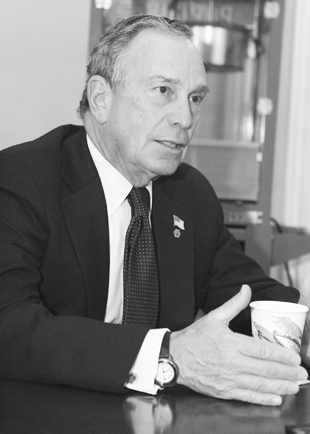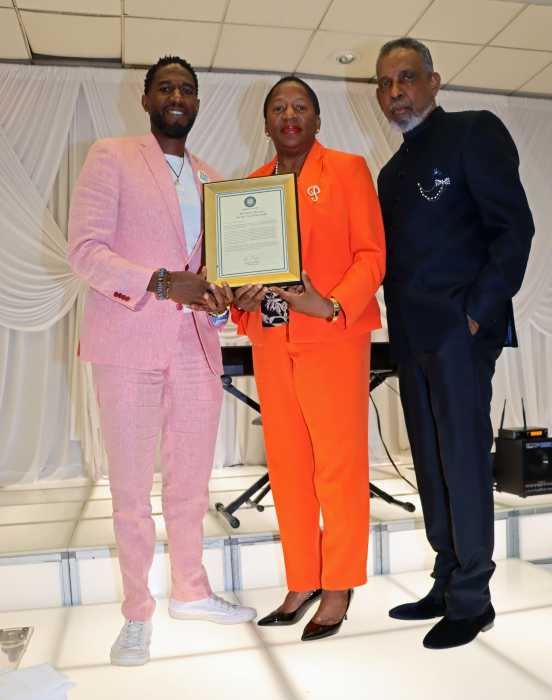Bloomberg Distances Himself from NYC’s Win that Nixed Gay Nups;
Offers to ‘Testify’ for Gay Marriage Before Legislature in Albany
“My hope is that the court will say that it is legal under the Constitution,” Republican Mayor Michael Bloomberg said this Monday about the same-sex marriage claims made in a lawsuit initiated last year by five gay and lesbian couples against New York City.
The mayor’s statement is significant—even difficult to understand—in light of the fact that he is the public official responsible for initiating an appeal against a first-round victory by the plaintiffs in February, when they won an affirmative ruling from Manhattan Supreme Court Justice Doris Ling-Cohan. Last Thursday, Bloomberg’s attorneys prevailed in that appeal in a ruling from an intermediate-level court overturning Ling-Cohan’s decision, in a four-to-one vote. The ultimate outcome of the Hernandez v. Robles case now rests with the Court of Appeals, the state’s highest—expected to take up a further appeal filed this time by the plaintiffs’ attorneys, Lambda Legal, but under no obligation to do so.
If and when the Court of Appeals takes up the case, the mayor will be represented by the city corporation counsel in arguing against the plaintiffs.
Is the mayor trying to have it both ways on the issue of same-sex marriage and what the appropriate avenue is to achieve that goal?
“I personally have always said I think that the government shouldn’t be in the business of telling people who they can marry,” Bloomberg said in the interview Monday with the publisher and editors of Gay City News, The Villager, and Downtown Express.
Yet, the mayor never specifically voiced his support for gay marriage rights until February, on the same day he announced that the city would appeal Ling-Cohan’s ruling. The judge had given the city 30 days during which to decide whether to appeal before her order went into effect, so it is very possible that had Bloomberg chosen not to appeal, same-sex marriages would now be taking place in the city.
Bloomberg this week explained his decision to appeal as one largely influenced by an analysis of the state Constitution carried out by the corporation counsel’s office.
“We believe, my corporation counsel believes that Judge Ling-Cohan’s decision is inconsistent with the state Constitution,” he said, when asked whether the city’s aim in the appeal was to overturn the decision or merely clarify the issue at the state’s highest court. “We had two judges upstate who ruled the other ways. And I think that we should let the courts decide with clarity what the law is.”
After stating his hope that the Court of Appeals affirms the gay plaintiffs’ constitutional claims, the mayor hastened to add, “I can tell you that our corporation counsel and the Law Department, who I think have some very good lawyers, their reading of the law is this does not. And they thought that Judge Ling-Cohan would be reversed. She was. And they don’t think an appeal of this decision will be successful.”
But not only did the mayor offer the hope that his own attorneys would not prevail at the state’s highest court, he was also unwilling to publicly cosign the arguments they made in challenging the February marriage victory.
In a legal brief filed on June 27 of this year, Michael Cardozo, the corporation counsel, argued that the claim to same-sex marriage did not constitute a “fundamental right” on which gays and lesbians could say they were not receiving the equal protection of the law. The state, Cardozo reasoned, must merely demonstrate a “rational basis” for limiting marriage to same-sex couples. The principal justification for the exclusionary nature of marriage, the city asserted, was that “the State could determine that it is important to encourage opposite-sex couples to marry to establish long-term relationships given the financial and legal obligations parents bear for their children.”
Asked about this argument, the mayor put considerable distance between himself and his attorneys.
“Your lawyers have an obligation to use all of the things that have been cited in other cases on similar issues,” he said. “I don’t think that the Law Department… the Law Department doesn’t have a view, if you will, whether we should or should not permit gay marriage. The mayor does have one, and I’ve said what it is. Sometimes I think when I look at the arguments they make, you say, you know, why did you have to make that? Why did you… it would be inflammatory to do it. They would argue that a good lawyer has an obligation to go out and do the best job for the client.”
Pressed whether the city’s principal argument in court essentially says that the children of gay and lesbian couples do not deserve the same legal protections and financial security as the offspring of straight parents, Bloomberg said, “Look, I…you know where I stand on all of this,” before adding that he hoped the plaintiffs would prevail.
Lambda Legal declined to comment on Bloomberg’s Monday statements.
Monday’s meeting was the first occasion on which Bloomberg sat down with gay press representatives since a meeting in the summer of 2001 when he was still only a mayoral candidate. At that time, he was emerging as a Republican willing to show unusually strong support for gay rights compared to others in his party. Since that time, however, he has clashed with community leaders on several key issues.
A measure intended to guarantee that city contractors offer their gay employees the same partner benefits that are given to straight workers and their spouses, championed by lesbian City Councilwoman Christine Quinn, was passed over his veto last year. Since then, the mayor has succeeded in winning a court challenge, not yet heard by the Court of Appeals, against the measure. Similarly, Bloomberg is refusing to implement an anti-bullying law in the public schools that would bar harassment based in sexual orientation or gender identity discrimination, as well as religious, racial, gender, or disability bias.
The mayor announced his plans to appeal the February marriage ruling at a dinner for the Washington-based Human Rights Campaign held at the Waldorf-Astoria Hotel. His statement elicited widespread boos and catcalls from the crowd. Still, in that speech, Bloomberg pledged to “argue” for a same-sex marriage law in Albany, should the court case ultimately be rejected. Since that time, the mayor has made clear that the appropriate moment for such a push is after the issue is resolved in the courts, likely sometime in 2007.
Asked whether he would be willing to join an education effort now to build public support for such a law, Bloomberg responded, “I don’t know, I mean, look, I’m the mayor of the city and I’ve got plenty of things.”
The mayor, however, then made his promise to advocate for gay marriage in Albany more concrete: “I will go and testify the way I said I would,” he said. “You don’t know very much about me. When I say I’ll do something, I’ll do something.”
At this point in the interview, Anthony Crowell, who serves as special counsel in the office of the mayor, jumped in to add that Bloomberg had directed him to convene “a legislative meeting among all the LGBT groups in the city in January where we’re going to discuss a variety of issues, identify our common goals, and pursue them accordingly.”
Alan Van Capelle, executive director of the Empire State Pride Agenda, said his group had not yet been contacted by the mayor’s office, but called Crowell’s plan “a great idea.”
“I look forward to getting my invitation, said Van Capelle, who added, “I hope the city loses, too. We wish they didn’t appeal in the first place.”
On other issues of interest to the community, Bloomberg reiterated his intention and that of Dr. Thomas Frieden, the city health commissioner, to reduce the number of annual deaths from AIDS from the current level of roughly 2,000 to half of that by the end of his second term.
“You can argue, ‘Why not take it to zero?’ We’re going to try, but one of the things the community should understand is we are going to focus on those programs that work and it’s the science that’s going to determine,” the mayor said. “We are playing with people’s lives. And I am going to not have people die on my watch where I could have saved them.”
Regarding the new public school curriculum on HIV/AIDS, announced on December 1, Bloomberg said, “The HIV program is a big deal. They’re doing it right.”
Asked about the decision not to resume condom demonstrations employed during the early years of the AIDS epidemic, but discontinued by the old Board of Education at the behest of former Mayor Rudy Giuliani, Bloomberg said, “I don’t mean to make light of it, but I suspect that most kids can figure out how to use condoms and how to put them on. The problem is not that; the problem is that kids don’t know enough to use condoms. They don’t understand the public health consequences whether it is transmission of diseases—some like HIV/AIDS that can become fatal—or teenage pregnancies.”
Quibbling about specifics of the new curriculum, the mayor insisted, missed the larger public health point.
“You know, I think for the community to start talking about that, if I were … what it seems to me to be important here is that the city is now back to having education on issues that are terribly important, life-changing decisions, sometimes life-threatening decisions that our children make,” he said. “That is the business of the schools to educate them and that we’re standing up and doing it.”
Bloomberg also offered a full-throated defense of Frieden’s decision in February to announce that the health department may have identified a new strain of multi-drug resistant HIV that could result in rapid progression to AIDS in those infected. The suspected new strain was immediately dubbed the super-virus and the subject of many hyperbolic accounts in the press, but city health officials have not found any additional evidence of its existence beyond the initial individual identified.
“You know, it’s like we had this one guy who passed a lie detector test saying there was going to be an attack on the subway system,” the mayor said, recalling the October terror alert. “I deployed the police. We all pray that that guy was wrong. We all pray that it’s not a super-virus. Tom has an obligation as do I to err on the side of taking precaution. I have zero regrets about that whatsoever and I would hope he would do exactly the same thing again.”
Bloomberg, in fact, used the occasion of the interview to offer very strong praise for his health commissioner’s performance.
“Frieden is the best advocate, the best scientist, doctor you will ever have in a similar position in any government anyplace in the world,” the mayor said. “He is one of the top four or five epidemiologists in the world. He is somebody who has in his heart—he wants to help people. There’s nothing political about him at all.”
gaycitynews.com



































